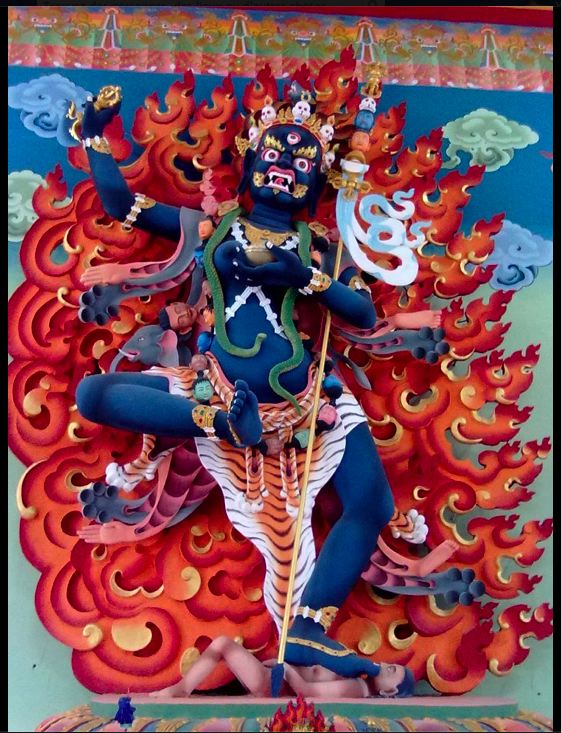Tröma Nakmo (Dudjom)

Tröma Nagmo (The Black Wrathful Dakini), represents the innermost secret aspect of the Khandro in the Dudjom Tersar lineage.
She is the feminine embodiement of wisdom. The chöd practice of Tröma Nagmo provides us with an extremely powerful means to cut through the dualistic clinging of mind, the root of suffering thus revealing our inherent wisdom nature.
The Origins of the Terma
Foreseeing the difficulties of future times, Guru Rinpoche in his compassion revealed a rare teaching of The Black Wrathful Dakini to his chief consort Yeshe Tsogyal, who later concealed this as a terma (hidden treasure teaching). This treasure was to be discovered at an appropriate time by one of the reincarnations of Padmasambhava’s twenty-five disciples, Khye'u Chung Lotsawa. Khye'u Chung Lotsawa reincarnated as Rigdzin Düddul Dorje, the great revitaliser of the Khatok lineage, and then later as the meditation master and tertön Dudjom Lingpa (1835-1904).
Dudjom Lingpa received direct transmissions of the Tröma Nagmo cycle through a serie of visions of Machik Labdrön, Saraha, Padampa Sangye and others. He kept the practice secret for some time before teaching,
The Actual Practise
In the Dudjom Tersar tradition, the practice of Tröma Nagmo contains the complete path of Vajrayana, from Ngöndro (the preliminary practices) all the way through the Dzogchen practices of Trekchö and Tögal. According to Chagdud Tulku Rinpoche, 'The Tröma Nagmo-based practice of Chöd removes obstacles, both for our short-term happiness and those hindering our ultimate enlightenment. It carries extraordinary healing power and through its practice we can accumulate merit and wisdom in a vast and rapid way. Merely making a connection to Tröma Nagmo practice brings great benefit and blessings'.
The Signs
At least thirteen of Dudjom Lingpa's disciples attained Rainbow body through the practice of Tröma Nagmo.